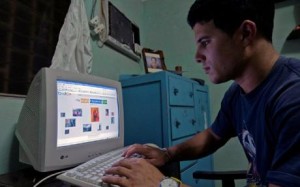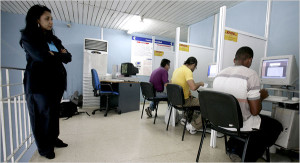CUBAN DOCTORS START GETTING 25 HOURS PER MONTH IN SLOW INTERNET.
They are starting to be connected, though at very slow speeds, and for just 25 hours a month. But it does mark a step forward towards development.
Last week Cuban doctors had access to the Internet (25 hours/month), as the well-known server Infomed came to form part of the globalized world of communications. It wasn’t easy, but it finally arrived, although the Internet that Cuban doctors now access is slow. Very slow. Instead of “broadband” we are talking about “narrowband.” Nevertheless, it does represent progress towards development.
Because this happened in Cuba, doctors had to find out about it, little by little, over “Radio Bemba.” There was no announcement, of course, in the press, on the radio, or on television. The authorities in charge of introducing changes are apparently not even authorized to inform the interested parties. Everything happened under wraps, which means that even the doctors are spreading the good news in whispers, and only to trusted colleagues, as nobody knows what might happen if they are caught committing such a serious indiscretion.
Internet, Wi-Fi (“wee-fee,” as we Cubans say), smartphones and tablets are revolutionizing Cuba, but not as some had envisioned, Arab Spring style. They are changing minds, and have revealed to be
unfounded the fears harbored by some who are stuck in the Stone Age, who had augured great social cataclysms caused by the new information and communications technologies.
Doctors are eagerly looking for any information on their profession, young people opt for videogames, relatives and friends chat and can see each other via IMO, students do research on the subjects they are studying, and bloggers and journalists get information and publish their ideas and opinions, which may be valid or not, but it is their right. The Internet, in spite of everything, and above all, is perhaps the most democratic development in human history.
With a click I can say whatever I want, find out about what interests me, and even what does not; or escape from disagreeable things and the cyberstupidity that floods the Web. But, most importantly, I make the decisions. Each individual has control over what he does, and that feels good.
The terms chat, blog, and post are already part of a still small number of Cubans’ vocabularies. But their numbers will grow, based on promises by the communications and computers authorities, not only because there will be more equipment, but because prices will drop too. Hallelujah!
The world is changing, and so is Cuba, albeit grudgingly. Not long ago the profits earned by the companies producing the most modern technologies were bitterly criticized (Letter by Fidel Castro to the VII Congress of the UNEAC, 1 April 2008), without pausing to perceive the benefits that they bring to the economies of the countries where they operate, regardless of whether their governments are on the Right or Left.
It will not belong before technological backwardness will be overcome, along with psychological hang-ups leading to hunts for satellite dishes and camouflaged cables. Fear of the Internet already belongs to another era. One that is, hopefully, over forever. We look forward to the day when we can see the world from the comfort of our homes, acquire knowledge that is still barred, and see our grandchildren, born in distant places, more often.
Agencies/DDC/Hildebrando Chaviano, La Habana/InternetPhotos/www.TheCubanHistory.com
The Cuban History, Hollywood.
Arnoldo Varona, Editor.
MEDICOS CUBANOS COMIENZAN A RECIBIR 25 HORAS POR MES EN UN LENTO INTERNET.
Ellos están comenzando a ser conectado, aunque a velocidades muy lentas, y por sólo 25 horas al mes. Pero sí es un paso adelante hacia el desarrollo.
La semana pasada, los médicos cubanos tenían acceso a Internet (25 horas / mes), como el servidor conocido Infomed llegó a formar parte del mundo globalizado de las comunicaciones. No fue fácil, pero finalmente llegó, aunque el internet que los médicos cubanos ahora el acceso es lento. Muy lento. En lugar de “banda ancha” estamos hablando de “banda estrecha”. Sin embargo, sí representa el progreso hacia el desarrollo.
Porque esto sucedió en Cuba, los médicos tuvieron que encontrar información sobre él, poco a poco, a lo largo de “Radio Bemba”. No hubo anuncio, por supuesto, en la prensa, en la radio o en la televisión. Las autoridades a cargo de la introducción de cambios son aparentemente ni siquiera autorizados a informar a las partes interesadas. Todo ocurrió en secreto, lo que significa que incluso los médicos están difundiendo las buenas noticias en voz baja, y sólo a los colegas de confianza, ya que nadie sabe lo que puede ocurrir si son sorprendidos cometiendo una indiscreción tan grave.
Internet, Wi-Fi (“-fee wee”, como decimos los cubanos), los teléfonos inteligentes y las tabletas están revolucionando Cuba, pero no como algunos habían previsto, el estilo de la primavera árabe. Están cambiando mentes, y han puesto de manifiesto que
infundado el temor albergadas por algunos que están atrapados en la Edad de Piedra, que había augurado grandes cataclismos sociales causados por las nuevas tecnologías de la información y de las comunicaciones.
Los médicos están ansiosamente buscando alguna información sobre su profesión, los jóvenes optan por videojuegos, parientes y amigos chatear y pueden verse entre sí a través de la OMI, los estudiantes hacen investigaciones sobre los temas que están estudiando, y los bloggers y periodistas a obtener información y publicar sus ideas y opiniones, que pueden ser válidas o no, pero es su derecho. El Internet, a pesar de todo, y sobre todo, es tal vez el desarrollo más democrático en la historia humana.
Con un clic puedo decir lo que quiera, averiguar sobre lo que me interesa, e incluso lo que no funciona; o escapar de las cosas desagradables y el cyberstupidity que inunda la Web. Pero, lo más importante, yo tomo las decisiones. Cada individuo tiene el control de lo que hace, y que se siente bien.
Los términos chat, blog, y después de que ya son parte de un todavía pequeño número de vocabularios de los cubanos. Pero sus números crecerán, basado en las promesas de las autoridades de comunicaciones y computadoras, no sólo porque habrá más equipo, sino porque los precios bajarán también. ¡Aleluya!
El mundo está cambiando, y también lo es Cuba, aunque a regañadientes. No hace mucho tiempo los beneficios obtenidos por las empresas productoras de las más modernas tecnologías se criticaron amargamente (Carta de Fidel Castro al VII Congreso de la UNEAC, 1 de abril de 2008), sin detenerse a percibir los beneficios que aportan a las economías de los países donde operan, independientemente de que sus gobiernos están en la derecha o izquierda.
No va a pertenecer antes se superará el atraso tecnológico, junto con psicológicos obsesiones que conducen a la caza de las antenas parabólicas y cables camuflados. El miedo a la Internet ya pertenece a otra época. Uno que es, con suerte, más siempre. Esperamos con interés el día en que podamos ver el mundo desde la comodidad de nuestros hogares, adquirir conocimientos que todavía está prohibido, y ver a nuestros nietos, nacidos en lugares distantes, más a menudo.
Agencias / DDC / Hildebrando Chaviano, La Habana / InternetPhotos / www.TheCubanHistory.com
La Historia de Cuba, de Hollywood.
Arnoldo Varona, Editor.



 CUBAN DOCTORS Start Getting 25 Hours Per Month in Slow INTERNET. + MÉDICOS CUBANOS Comienzan a Recibir 25 Horas por Mes de un Lento INTERNET.
CUBAN DOCTORS Start Getting 25 Hours Per Month in Slow INTERNET. + MÉDICOS CUBANOS Comienzan a Recibir 25 Horas por Mes de un Lento INTERNET.


